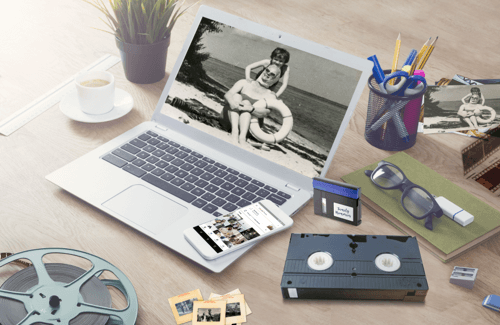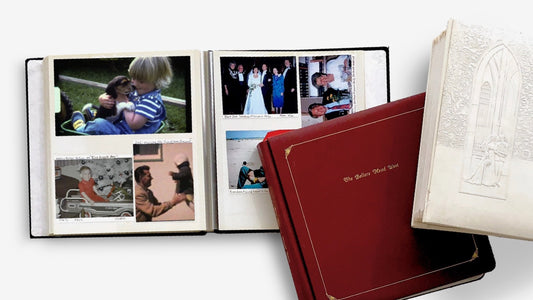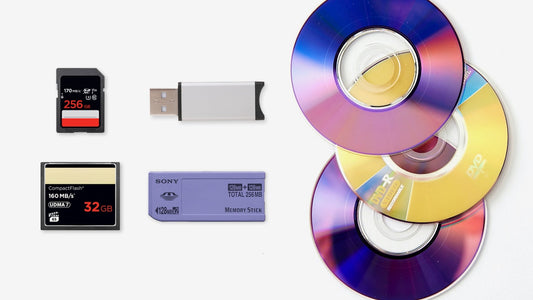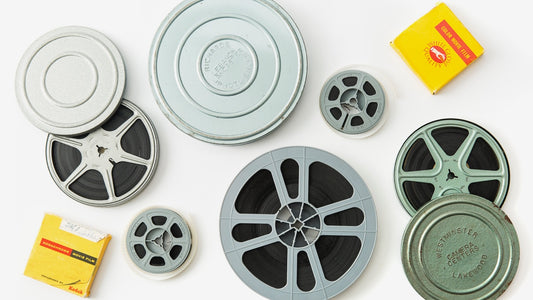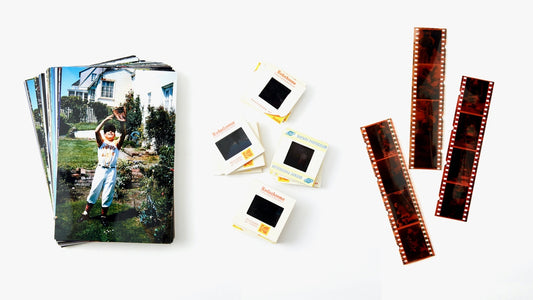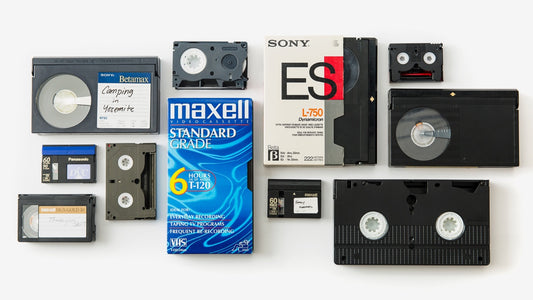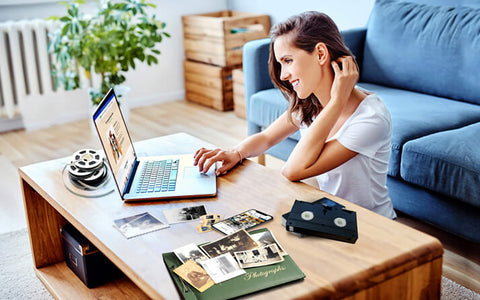If you’ve ever stumbled upon a box of old video tapes, you know they're like little time capsules holding precious glimpses of the past. But here's the hard truth: the magnetic tape inside is slowly degrading, and finding a working VCR is a challenge. The only way to truly protect these moments is with a video tape to digital conversion. This process safeguards your recordings from decay and makes them incredibly easy to watch and share with family. Let's walk through your options—from DIY to professional services—so you can preserve your memories for good.
Key Takeaways
- Safeguard Your Family's Legacy: Converting video tapes to digital protects precious memories from physical degradation and makes them easily viewable on modern devices.
- Select Your Ideal Conversion Route: Weigh factors like your budget, technical comfort, and desired quality to choose between convenient professional services or a hands-on DIY project.
- Enhance Your Digital Collection: Prepare your tapes before conversion and organize the resulting digital files thoughtfully to ensure lasting quality and effortless sharing.
Why Should You Digitize Your Video Tapes?
Those stacks of video tapes in your attic? They're treasure chests of irreplaceable moments – baby's first steps, family holidays, heartfelt messages. But here's the thing: those tapes won't last forever. Thinking about digitizing your home movies is key to ensuring these memories live on. It’s about safeguarding your family’s legacy and keeping those precious moments accessible.
Safeguard Your Most Precious Memories
A primary reason to convert video tapes to digital is to protect those precious memories. Physical tapes like VHS or Hi8 are vulnerable to heat, humidity, dust, or accidental spills. Imagine the heartbreak if a tape with priceless footage was damaged. When you transfer your video tapes to digital, you create a durable copy, shielded from physical wear and tear. This means your cherished moments are preserved, ensuring they remain vibrant and intact for your family to enjoy for years to come.
Watch and Share Your Videos Anywhere
When was the last time you hooked up a VCR? Finding working playback equipment for old tapes is a challenge. Digitizing your videos changes all that. Once digital, you can easily watch them on your computer, smartphone, or smart TV – devices you use daily. Imagine pulling up an old family vacation video on your phone or streaming your wedding video. Plus, digital files are incredibly easy to share with family and friends, no matter where they are. A few clicks, and everyone can relive those special times together.
Stop Your Tapes from Fading Away
Video tapes also face a natural enemy: time. The magnetic tape inside formats like VHS wasn't made to last forever; it degrades, typically showing wear within 10 to 25 years, even with careful storage. This leads to fuzzy pictures, distorted sound, or complete loss of footage. Each passing year increases this risk. Making the move to convert your tapes to digital is crucial to stop this degradation. By creating a digital copy, you freeze those memories in their current state, ensuring they don't fade as the physical tapes age. It’s a proactive step to save irreplaceable moments.
Hiring a Pro: Your Guide to Conversion Services
If the idea of sifting through stacks of old video tapes feels a bit much, or if you're really aiming for top-notch quality, turning to professional conversion services is a wonderful choice. These companies are experts at transforming your cherished old media into modern digital formats, which means you don't have to worry about the technical side of things. They have the specialized equipment and know-how to handle all sorts of tape formats, even those that might have become a little delicate over time. Plus, they can often get your order completed much more quickly than you might manage on your own. It really comes down to balancing convenience and quality with the cost.
Spotlight on a Popular Service: YesVideo
When you're handing over your precious memories, you want to know they're in good hands. At YesVideo, we've been helping families preserve their home movies and photos for more than 20 years. We truly get that those tapes hold irreplaceable moments. Our VHS conversion process is carefully designed to turn your aging tapes into digital files that are easy to watch, share, and enjoy for years to come. Every single order is processed by hand, right here in the USA, ensuring your memories receive the dedicated care they deserve. We like to think of ourselves as your partners in protecting your family’s legacy.
Exploring Other Professional Options
While we're incredibly proud of the work we do at YesVideo, it’s always smart to know what other options are out there! Several other companies also offer video tape conversion, and here are a few you might come across:
- Walmart Video Transfer: Many are familiar with Walmart, and they provide a video transfer service that can digitize videotapes, film, photos, and slides.
- Legacybox: This is another recognized name in digitization. They simplify the process by sending you a prepaid shipping kit for your media and keep you updated along the way.
- Costco Photo Center: If you’re a Costco member, their Photo Center offers services to convert old video tapes, helping you keep those memories in an accessible format.
- CVS Photo: Similar to other large retailers, CVS Photo has a Home Movie and Photo Transfer service that can handle your VHS tapes.
- Capture Media Digitization Services: Capture emphasizes their long experience in the field and offers various delivery formats, often highlighting quick turnaround times.
Company Experience and Trust Signals
When you're choosing a professional service for video tape conversion, it's really important to look at their experience and reputation. You're handing over one-of-a-kind memories, so you want to feel confident they're in safe hands. For example, a company like YesVideo has been specializing in preserving home movies for over 20 years. Knowing that every order is processed by hand in the USA adds a layer of trust and shows a real commitment to protecting your family’s legacy. Other well-known options like Legacybox simplify the process with prepaid shipping kits, while familiar names like Walmart and CVS Photo also offer video transfer services, leveraging their long-standing retail presence to provide peace of mind. Looking for these kinds of trust signals can help you make the best choice for your precious tapes.
Pro vs. DIY: What’s the Quality Difference?
A big question on many people's minds is about the final quality. Generally, professional services like YesVideo can deliver a higher quality conversion than what you might achieve with a typical DIY setup. We use specialized, professional-grade equipment that’s regularly maintained and calibrated for the best possible output. This often translates to better color correction, less visual noise, and more successful handling of tapes that aren't in pristine condition. While doing it yourself can be a rewarding project, professional services usually provide more consistent and clearer results, especially if your tapes are older or a bit fragile. You're essentially investing in expertise and equipment that's a step above home solutions.
Understanding Digital File Quality
So, what does "quality" really mean when it comes to your new digital files? It’s about capturing the clearest, most stable version of your original recording. Two key factors here are resolution and file format. Resolution is all about the sharpness of the image. While a conversion can't create detail that wasn't on the original tape, a professional video transfer will capture the absolute best possible picture from your VHS or camcorder tapes. Then there's the file format, which affects how the video is stored. We provide your memories in a widely-compatible format like MP4, which gives you a great balance of high quality and a file size that’s easy to download, store, and share with your loved ones.
How Much Do Professional Services Cost?
The cost of having your video tapes professionally converted can vary. It often depends on how many tapes you have, their format, and any extra services you might opt for, like getting multiple digital copies or DVDs. Some services charge on a per-tape basis, while others might offer discounts for bulk orders or specific packages. It’s a good idea to get quotes from a couple of different places and make sure you understand exactly what’s included. As some in the industry note, the cost differs significantly between DIY and professional routes, with professional services typically being more per tape but offering key benefits in quality and ease.
Average Costs and Pricing Models
When you start looking into professional services, you'll find that pricing is usually straightforward, but it helps to know the common models. Most companies charge on a per-tape basis, which makes it easy to estimate your total cost. The price per tape can range quite a bit, generally falling somewhere between $7.50 and $35. This variation often reflects the level of service, the technology used, and what's included in the final package. For example, a lower price might just get you a basic DVD, while a higher price could include a high-resolution digital download, minor video enhancements, and cloud storage access. It’s all about finding the balance between your budget and the features that matter most to you.
Pricing Examples from Popular Services
To give you a clearer picture, let's look at what some well-known services charge. You'll find that many big-box retailers offer digitization. For instance, Walmart's VHS to DVD transfer service is priced around $24.96 per tape. Similarly, CVS Photo offers conversions starting at $25.99 for most media types. Another popular option, Legacybox, uses a kit-based system where the cost for a single standard tape is about $30. These examples show that prices are often competitive, but it's always a good idea to check what's included—like whether you get a DVD, a USB, or a digital download—as that can affect the overall value.
Potential Extra Costs
It’s also wise to keep an eye out for potential extra costs that might not be obvious at first glance. The advertised price is often just the starting point. For example, if you want extra copies of your DVDs for family members or a USB drive in addition to a digital download, those will typically be add-on charges. Some services that use a pre-paid box model, like Legacybox, will bill you for any extra tapes you send that go beyond your kit's limit. To avoid any surprises, take a moment to read the service details carefully and understand what your payment covers. Don't hesitate to ask about fees for different output formats or shipping before you commit.
How to Save Money on Professional Conversion
Everyone appreciates a good deal, right? Many video conversion services, YesVideo included, often run promotions or offer package deals, which can be especially helpful if you have a large collection of tapes. It’s always a smart move to check a company’s website for any current offers before you send in your memories. For example, services like Legacybox sometimes advertise special sales events. Keep an eye out for seasonal discounts or bundles that can make professional conversion an even better value. Signing up for company email newsletters can also be a great way to stay informed about upcoming promotions.
What to Expect from a Professional Service
Deciding to use a professional service is a big step toward preserving your memories, and it helps to know what the journey looks like. From the moment you pack up your tapes to when you receive your new digital files, the process is designed to be straightforward and secure. Most companies have refined their systems to handle your precious cargo with the utmost care. You’re not just sending tapes; you’re entrusting someone with irreplaceable moments, and a good service understands that. They’ll guide you through each step, ensuring you feel confident and informed along the way. Let’s walk through what you can typically expect when you hand your memories over to the experts.
The Conversion Process from Start to Finish
Once you place an order, the first step is getting your tapes to the professionals. Most services, including us at YesVideo, make this incredibly simple by sending you a welcome kit. This box comes with everything you need: instructions, packing materials, and often a prepaid shipping label. Your job is to carefully pack your tapes, photos, or film reels and send them off. After your media arrives at the facility, it’s checked in and prepared for digitization. Technicians then use specialized equipment to carefully convert your footage into high-quality digital files. Once the transfer is complete, you’ll receive your digital memories—often via a cloud link, USB, or DVD—along with your original tapes.
Sending Your Tapes Safely
The thought of mailing your only copy of a cherished memory can be nerve-wracking, but professional services have this down to a science. The welcome kits they provide are typically sturdy and designed to protect your media during transit. For example, services like Legacybox send a crush-proof box with a prepaid UPS shipping label to ensure a secure journey. At YesVideo, we provide a similar crush-proof box and a prepaid shipping label, so you can send your memories with peace of mind. Following the packing instructions carefully is key to ensuring everything arrives safe and sound, ready for its digital transformation.
Security and Tracking Measures
Once your box is on its way, you’ll want to know it’s being tracked. Reputable companies assign unique barcodes to every single tape, film reel, or photo album you send. This allows you to monitor your order’s progress from the moment it leaves your hands until it’s safely returned. At YesVideo, we track your order every step of the way with barcodes and email updates. Our secure facility is monitored 24/7, and every order is processed by hand by our team of trained technicians. This level of care ensures your memories are never misplaced and are always handled respectfully.
How Long Does It Take?
Patience is part of the process, as high-quality digitization takes time. The turnaround time for professional conversion services can vary quite a bit, depending on the company, the time of year, and the size of your order. Generally, you can expect the process to take anywhere from a few weeks to a couple of months. For instance, some services like Walmart Video Transfer estimate a 3 to 4-week turnaround. It’s always a good idea to check the company’s current processing times on their website before you order, especially if you have a specific deadline in mind, like an anniversary or a family reunion.
Comparing Turnaround Times
When you’re researching different services, you’ll notice a range of timelines. Some companies, like Legacybox, note that standard processing can take up to 10-12 weeks, but they also offer faster options for an additional fee. These expedited services can shorten the wait to just a few weeks or even 10 business days if you’re in a real hurry. At YesVideo, we also provide clear estimates for our turnaround times, so you know what to expect. The key is to balance your budget with your timeline and choose the option that works best for your needs.
What Tape Formats Can Be Converted?
Worried that your old, obscure tape format can’t be digitized? You might be surprised. Professional services are equipped to handle a wide variety of video tape formats, covering decades of home movie technology. This includes the most common ones like VHS, VHS-C, and S-VHS, as well as others like BetaMax, Hi-8, Digital8, Video8, and MiniDV. If you have a mix of different tape types, a professional video transfer service is your best bet. They have the right playback decks and conversion technology to handle almost any format you can find in your attic, ensuring no memory gets left behind.
Going DIY: How to Convert Video Tapes at Home
Thinking about tackling your video tape conversion project yourself? It's definitely an option if you're a bit tech-savvy and have some time on your hands. Going the DIY route can feel rewarding, and you get to control the entire process. However, it’s good to know what you’re getting into before you start. Let's walk through what you'll need, the steps involved, and some common things to watch out for.
What Equipment Do You Need for DIY Conversion?
Alright, first things first: the equipment. To transform those analog VHS signals into digital files, you'll need a couple of key items. The most common piece of hardware is a VHS-to-digital converter. These little gadgets are designed specifically for this task. Alternatively, you might use a VCR (you’ll need one that’s still in good working order!) connected to a computer via a video capture card. Don't forget the necessary cables – usually RCA cables (the yellow, red, and white ones) – to connect your VCR to the converter or capture card. Some converters also record directly to an SD card or USB drive, which can simplify things a bit, letting you bypass the computer initially.
Your Step-by-Step Guide to DIY Conversion
Once you've gathered your gear, it's time to convert! If you're using a VCR and a capture device, connect the VCR’s video and audio outputs to the capture device’s inputs using those RCA cables. Then, connect the capture device to your computer, usually via USB. You'll need software to manage the recording; some capture devices come with their own, or you might use general video editing software. Pop in your tape, hit record on the software, and press play on the VCR. Another route is an all-in-one VHS-to-DVD recorder. With this method, you’d record your tape to a DVD-R, then "rip" that DVD into a digital file on your computer using software like Handbrake.
Common DIY Pitfalls (And How to Avoid Them)
Now, let's talk about quality. The final look of your digitized videos will heavily depend on the original condition of your VHS tapes and the quality of your conversion equipment. VHS tapes have an inherently limited resolution, so don't expect your home movies to suddenly look like 4K masterpieces. Common issues you might encounter include a fuzzy picture, colors that seem to bleed, an annoying audio hum, or those familiar tracking lines. While some of these can be inherent to the old tapes themselves, the conversion equipment and process can also introduce new quirks if not handled carefully. It often takes a bit of trial and error to get the settings just right for the best possible outcome.
Is a DIY Conversion Worth Your Time?
One of the biggest factors to weigh with DIY conversion is the time commitment. Converting tapes is a real-time process, meaning a two-hour tape will take at least two hours to digitize – and that’s before any editing or troubleshooting you might need to do. If you have a large collection of tapes, this can quickly add up to many hours, even days, spent monitoring recordings. Beyond just the recording time, there's the initial setup, learning any new software, and potentially dealing with stubborn tapes or technical glitches that pop up. It really requires patience and a willingness to learn some new technical skills along the way.
Pro vs. DIY: A Head-to-Head Comparison
Deciding whether to use a professional service or go the DIY route for converting your video tapes to digital can feel like a big choice. Both paths have their pros and cons, and what's best for you really depends on your priorities – things like how much quality matters, what your budget looks like, and how much free time you have on your hands. Let's break down the key differences to help you figure out which approach makes the most sense for preserving your precious memories.
Think about what you value most. Is it pristine quality and minimal effort on your part, or are you looking to save some money and don't mind a bit of a project? Understanding these factors will guide you to the right decision for your family's tapes and ensure your cherished moments are preserved.
Which Method Delivers Better Quality?
When it comes to the final product, there's often a noticeable difference in video and audio quality between professional services and DIY methods. Professional services, like our video transfer at YesVideo, use high-end, specialized equipment designed to get the best possible picture and sound from your old tapes. We also have technicians who know how to handle various tape formats and troubleshoot common issues that can pop up.
If you're converting tapes at home, the quality will largely depend on the condition of your original VHS tapes and the gear you use. It's important to remember that VHS tapes have inherent quality limitations; you won't be getting 4K resolution, no matter the method. However, professional services are generally better equipped to maximize the potential of your tapes, often resulting in a clearer, more stable digital file that truly honors your memories.
Breaking Down the Costs: Pro vs. DIY
At first glance, DIY seems like the cheaper option. You buy a converter, maybe an old VCR if you don't have one, and you're set, right? Well, not exactly. While the upfront cost for DIY might be lower, especially if you only have a few tapes, there are other factors to consider. Your time is valuable, and DIY conversion can take a lot of it. Plus, there's a learning curve, and you might need to purchase software or deal with unexpected technical hiccups along the way.
Professional services have a per-tape cost, which can add up if you have a large collection. However, this cost includes the expertise, high-quality equipment, and convenience of having someone else do the work. When you factor in the potential for better quality and the time saved, a professional service can be quite cost-effective, especially for those irreplaceable memories you want to digitize with care.
How Much Time and Effort Does Each Method Take?
This is where professional services really shine. Converting video tapes yourself is a time-consuming process. For every hour of footage on a tape, you'll spend at least that much time actively converting it, and that doesn't include setup, troubleshooting, or any editing you might want to do afterward. If you have a box full of tapes, that’s a significant time commitment. Imagine spending weekends tethered to your computer, monitoring conversions one by one.
Opting for a professional service means you simply pack up your tapes and send them off. Companies like YesVideo handle the entire process for you, from cleaning and repair if needed, to the actual transfer, and then delivering your digital files and original tapes back to you. The convenience factor is huge, especially if you have a busy schedule or a large number of tapes to convert.
What's the Best Way to Handle Damaged Tapes?
Older media, like VHS tapes or even more delicate film reels, can degrade over time. Tapes can become brittle, moldy, or tangled. If you're dealing with tapes that are not in perfect condition, DIY conversion can be risky. You might accidentally cause further damage, or the playback quality could be severely compromised. Professional services are generally better equipped to handle these situations with the necessary expertise.
Experts at places like YesVideo have experience with common tape issues and may have tools or techniques to carefully repair or clean tapes before conversion. For particularly old or fragile media, a professional service ensures your memories are handled with care and converted into a format that’s ready for the future. Trying to salvage damaged tapes yourself without the right know-how can sometimes lead to irreversible loss, which is the last thing anyone wants for their family history.
Making Your Decision: Pro or DIY?
Deciding how to bring your treasured video tapes into the digital age can feel like a big decision, but I promise it’s simpler than it sounds once you know what to look for. The best approach for you really boils down to a few personal factors: your budget, how much free time you have on your hands, your comfort level with technology, and the kind of quality you're aiming for. It’s all about finding that perfect balance between beautifully preserving your memories and what’s practical for your life right now.
Key Questions to Ask Yourself
When you're weighing your options, the first thing most people think about is cost. Going the DIY route with a converter might seem like the cheaper option initially, but it often demands a significant investment of your time and a certain knack for tech. Plus, the final video quality might not always meet your expectations. On the other hand, professional services, like our video transfer options, generally have a higher per-tape cost, but you're paying for expert handling, convenience, and often, a much better result.
Beyond the initial price tag, think about the length and condition of your tapes. Longer tapes naturally take more time to convert, and if any are damaged or showing their age, they might need some extra TLC. Also, consider how you’d like to receive your newly digitized memories – perhaps on a USB drive, a DVD, or conveniently stored in the cloud. These choices can influence both the overall cost and the smoothness of the process, whether you decide to tackle it yourself or entrust it to professionals.
Choosing a Reputable Service
If you decide to go with a professional service, picking the right one is crucial since you’re trusting them with your family's history. Look for a company with a solid reputation and plenty of experience. For example, a service like YesVideo has spent over 20 years focused on preserving home movies, and they process every order by hand in the USA, which can offer a lot of peace of mind. You'll also see other well-known names like Legacybox, which simplifies the process with a prepaid shipping kit, or services offered through retailers like Walmart and CVS. When comparing your options, be sure to read recent customer reviews, ask about their process for handling older or slightly damaged tapes, and get a clear idea of their turnaround time. This little bit of homework helps ensure your memories are in the best possible hands.
When It Makes Sense to Hire a Pro
Opting for a professional service is a fantastic choice if you’re looking for top-notch quality without the hassle of figuring it all out yourself. When you send your tapes to a service like YesVideo, we take care of the entire digitization process for you. This means your home movies are carefully handled by experts, and you typically get them back faster than if you were to manage the project on your own. While it’s true that professional services come with a higher per-tape cost, for those irreplaceable memories, the peace of mind and superior results are often well worth the investment.
If you don't consider yourself particularly tech-savvy, are juggling a busy schedule, or simply want the best possible outcome for your precious videos, letting professionals handle the conversion is definitely the way to go. It’s also worth noting that if you only have a handful of tapes, using a professional service can sometimes be more economical and yield higher quality results than purchasing all the necessary DIY equipment for a small batch.
Is the DIY Route a Good Fit for You?
If you're working with a more limited budget but have a larger collection of tapes, and you don't mind a bit of a project, a DIY approach could be a good fit. Investing in a decent capture device that connects your old VCR to your computer can be a cost-effective solution when you're looking to convert a substantial number of tapes. This route certainly puts you in the driver's seat, giving you full control over the process from beginning to end.
However, it’s important to be realistic about the time commitment. Each tape needs to be played in its entirety to capture the footage, and then you might spend additional time editing or organizing the digital files. You'll also need a comfortable understanding of technology to set up the equipment correctly and troubleshoot any hiccups along the way. While it can be a rewarding endeavor, especially if you enjoy tinkering with tech, be prepared for the possibility of lower video quality compared to what you'd get from a professional film transfer service, especially if you're new to video conversion.
Tips for a Successful Video Tape to Digital Conversion
So, you've decided how you're going to bring your cherished video tapes into the digital age—fantastic! Whether you're entrusting them to a professional service like YesVideo or you're ready to roll up your sleeves for a DIY project, the next step is making sure you get the absolute best results. A little bit of thoughtful preparation and planning can truly make a world of difference. Think of it as lovingly preparing a new, safe home for your irreplaceable memories, ensuring they’re not just preserved, but also easy to enjoy and share for many years to come.
How to Prep Your Tapes for the Best Quality
Before your tapes begin their journey to digital, taking a few simple preparatory steps can significantly enhance the quality of the final files. As the team at YesVideo wisely notes, "taking a few simple steps to prepare your VHS tapes can make a big difference in the quality of your digital conversions." Start by gently wiping the outside of your tapes with a soft, dry cloth to remove any dust. If you spot any cracks in the casing or damage to the tape itself, make a note of it. It’s also incredibly helpful to label each tape clearly, even if it’s just a general idea of the contents – "Summer Vacation 1992" or "Kids' Birthdays." This will be a lifesaver when you’re organizing your new digital library. Understanding the common mistakes to avoid when digitizing can also prevent potential hiccups and ensure your memories are handled with the utmost care.
Which Digital Format Should You Choose?
Choosing the right digital format for your converted videos might sound a bit technical, but it's a key part of making sure your memories stay accessible and vibrant for the long haul. You're looking for a format that's "future-ready," meaning it will play nicely on various devices and software, not just today but years from now. The whole point of converting video tapes to digital is to rescue those precious moments from the physical wear and tear that old tapes eventually succumb to. For most of us, MP4 is a fantastic choice because it strikes a great balance between high quality and manageable file size, and it’s widely compatible. If you’re using a professional service, they’ll typically select the optimal format for you, ensuring your digital memories are preserved beautifully and are easy to use.
Common Output Formats (MP4, DVD, and Blu-ray)
Once your tapes are digitized, you'll get to choose how you want to receive your memories. You can often get them back as a digital copy, on a USB drive, or as a set of DVDs. For most of us, the MP4 file format is the best all-around choice. It offers a wonderful balance between high-quality video and a file size that won’t clog up your computer, plus it’s compatible with virtually every modern device. Think of it as the universal key for your digital memories. DVDs are another option, and they can feel nostalgic with their custom menus and chapters, but just like VCRs, DVD players are becoming less common. While Blu-ray offers higher quality, it's less frequently used for standard home movie conversions.
Cloud Storage and Delivery Options
Many professional services, including YesVideo, offer the incredible convenience of cloud delivery. This means that once your videos are digitized, they’re uploaded to a secure online account where you can view, download, and share them instantly. It’s a fantastic way to get immediate access to your memories and easily send them to family, no matter where they live. Typically, you’ll have access to this cloud storage for a set period, like 90 days, which gives you plenty of time to download and save your files to your own computer or a personal cloud service like Google Photos. You can also opt to receive your files on a physical USB drive, which is a great way to have a tangible backup of your newly preserved moments.
How to Organize and Store Your New Digital Videos
Once your video tapes have been transformed into digital files, the next exciting step is organizing and storing them safely. Think about how you’ll want to find and relive these moments. A simple, clear folder system on your computer or an external hard drive is a great starting point – perhaps organized by year, by event (like "Weddings" or "Holidays"), or by family members. For even better peace of mind and easier sharing, storing your files in the cloud is an excellent option. This not only gives your family easy access from anywhere but also protects your memories if your local storage device fails. Many digitization services, including YesVideo, offer cloud storage solutions or provide your memories on convenient USB drives, making this part of the process a breeze compared to the hardware needed for a DIY conversion process.
Related Articles
- Best VHS Video to Digital Converters: Top Picks – YesVideo
- VHS to DVD: Top Transfer Services & DIY Guide – YesVideo
- Convert VHS to Digital: The Ultimate 2024 Guide – YesVideo
- VHS Converter Guide: Digitize Your Tapes with Ease – YesVideo
- Top 5 VCR to Digital Converters for Preserving Memories – YesVideo
Frequently Asked Questions
My old video tapes seem okay in their boxes. Why should I rush to digitize them? Even if your tapes look fine on the shelf, the magnetic material inside them is slowly breaking down over time – it’s just how they were made. Plus, finding a working VCR these days can be a real scavenger hunt! Digitizing means your memories are safe from further decay and you can actually watch and share them easily on your phone or computer, keeping those moments alive and accessible.
Professional services sound convenient, but is the extra cost really justified compared to doing it myself? It’s a great question! While DIY can save some money upfront, professional services bring specialized equipment and expertise that usually mean much better picture and sound quality. They also take the whole time-consuming process off your plate. Think of it as investing in the best possible future for those irreplaceable moments, especially if your tapes are very precious or you're not keen on a big tech project.
Some of my tapes are ancient and a bit worse for wear. Is there any hope for them? There's definitely hope! Professional services are often equipped to handle tapes that have seen better days, whether they're a bit brittle or have minor issues. They have techniques to carefully clean and convert them, which is generally safer than trying to play very old or delicate tapes in home equipment that could risk further damage. It's always a good idea to ask the service about your specific tapes.
I'm pretty handy with tech. How much time and effort does DIY video conversion actually take? That's a fair question! The main thing to know is that conversion happens in real time – so a two-hour tape takes at least two hours to capture, and that’s before any setup, software learning, or fixing any glitches. If you have a box of tapes, this can add up to many, many hours. While it can be a satisfying project if you enjoy it, be prepared for a genuine time commitment and potentially a bit of a learning curve to get decent results.
After I get my videos digitized, what’s the smartest way to store them so they don’t get lost again? Great question – protecting your newly digitized memories is key! I always recommend having at least two copies: one on an external hard drive and another in a secure cloud storage service. This way, if one storage method fails, you have a backup. Also, take a little time to name your files and organize them into folders that make sense to you, like by year or event. It makes finding and sharing those special moments so much easier down the road.





